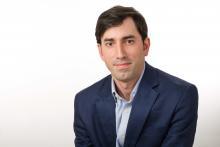Anti-Governmentalism: The Third Republican Debate
"Alzheimer's, diabetes, cancer and heart disease." Cure these chronic illnesses, Governor Mike Huckabee informed his audience at the third Republican debate, held October 28, 2015, and "we" can solve our issues with Medicare.
What a missed opportunity for leadership! In presidential campaigns from an older, more confident era, the candidate would have chosen this moment to commit the resources of the presidency to bold action.
Huckabee, tragically, never explained what he meant by "we." Someone running for president, however, should know the answer to that question. Indeed, Huckabee could find it by consulting the historical record. The government has consistently taken the lead in the fight against dread diseases. Thus the blight of tobacco-induced cancer was greatly reduced by the Surgeon General's reports of the 1960s and congressional legislation. And anyone who bothered to read the record would also discover the crucial role played by the National Institutes of Health in the fight against HIV/AIDS, or the support the government provided for mapping the human genome, which promises greatly to advance treatments for cancer. Indeed, you can track the government's record of success all the way back to Walter Reed and the fight against yellow fever in the early 1900s.
Alas, Huckabee is a prisoner of his ideology. He wants certain results. We all want Alzheimer's, diabetes, cancer and heart disease to disappear the way polio did in the 1950s. But Huckabee's ideology blinds him from seeing that the way to do that is through sophisticated, government-sponsored medical research.
Huckabee's heart might well be in the right place. We cannot say the same about some of the other participants. Let's consider Carly Fiorina and her comments on the relationship of government and economic order. The line of questioning began innocently enough. She was reminded that as the CEO of Hewlett-Packard she oversaw a generous 401(k) program for her employees. Would she take steps as president to extend 401(k) benefits to other, less-advantaged workers? Part-timers in the free-lance economy, perhaps, or workers at small businesses?
Her answer should frighten every American who works for a living. "There is no constitutional role for the federal government in setting up retirement plans. There is no constitutional role for the federal government to be setting minimum wages." What does she mean precisely? Would she ask the Supreme Court to overturn every wage and labor regulation dating back to the Woodrow Wilson administration? This was the moment to have asked her about child labor laws. Really, I hope someone does.
Chris Christie, on the other hand, occasionally presents himself as one of the adults in the room. But when he slips, he slips badly. He was reminded that he was one of the few Republican candidates for president to acknowledge the reality of global climate change and to concede that present patterns of energy consumption contribute hugely to a worsening greenhouse effect. He boasted in reply that New Jersey is third in the nation in the production of green energy, behind California and Arizona. And he simultaneously declared that green energy was a job for the private sector.
Except, well, it is not. The federal government has provided important support for renewable energy for decades. And that support is not something recent. Government has played a key role in sustaining and subsidizing renewable energy since before the construction of the Hoover Dam in the 1930's. Like Huckabee and Fiorina, Christie is a prisoner of his own ideology and cant. We might take him more seriously if he lapsed into sloganeering a little less.
And then there is Rand Paul, who declared: "Liberty thrives when government is small. I want a government so small I can barely see it." Really! How small is that? Would he join Carly Fiorina and repeal every twentieth- and twenty-first century social program? What about the food and drug laws? What about bank regulation? The Securities and Exchange Commission? What about those ambitious programs that are changing the course of the future, such as the space program? Social programs and government regulation came into being for a reason. The private sector failed, failed repeatedly, at alleviating human misery and regulating misconduct. We should not want to return to those days.
Donald Trump, for his part, would abolish gun-free zones. They've become "target practice for the sickos and the mentally ill." Better that people be armed. Asked whether he wished his employees to carry guns when on duty, Trump responded in the affirmative. This is madness. The nation needs tighter gun laws, not the total abolition of places of safety. There was a time, a quarter-century ago, when Donald Trump made sense on gun control. But that Donald Trump has vanished into a swirl of vanity, ambition, and orange-tinted hair.
Marco Rubio, I am sure, will be anointed by many as the "winner" of the evening's festivities, especially by a Republican establishment desperate to find someone, anyone, to confront the two front-runners, Trump and Ben Carson. But I predict that on closer inspection, Rubio's answers will be seen as shallow. Every time he was asked a difficult question, he dodged by attacking the media. The mainstream media, he wailed at one point, was the biggest super-pac of all, and it was solidly backing Hillary Clinton's candidacy.
Really, though, voters would like to know why he has missed all those Senate votes. And Becky Quick's question about Rubio's personal financial situation and his need to liquidate his retirement account after signing a million-dollar book deal piques my curiosity. I bet others are curious also. Rubio may well get a bounce in the polls from his performance, but it will be as transitory as the fleeting bump Fiorina received after the second debate.
There were three winners in last night's contest, Trump, Carson and Ted Cruz. In talking about Trump and Carson, I shall indulge in a bit of boxing history. Trump is Jack Dempsey. He swings away, he punches, he is always trying to cut the ring in half, closing in on his opponent, slugging, brawling, hoping to land the crushing blow. There is a part of the Republican electorate that likes these qualities. He is also nativist, intolerant, xenophobic even, and there are, sadly, many GOP voters who are drawn to that ugly message.
Carson, on the other hand is Archie Moore (1916-1998), the greatest of all the counter-punchers. Moore effortlessly graced the perimeter of the ring, lowering his torso in a patented shoulder roll that allowed opponents' blows to glance harmlessly away. Carson's performance did not lack for substance, though it is a substance so extreme that it might escape the attention of the casual listener. He still favors a biblically-mandated flat tax, and he more or less opposes Medicare. He would, in fact, favor the universal abolition of government subsidies. Carson would deservedly lose a general election in a landslide. But first, how do you lay a glove on him?
Indeed, I shall use an unusual adjective in describing Carson's performance, but it seems to fit: He is sleep-inducing, yes, and he is painfully soft-spoken. But I suspect he comes across to many television viewers as serene. It is his demeanor, his utter, preternatural calm, and not the substance of his remarks that is his strongest attribute. And that quality will take him farther than he has any right to go.
For Ted Cruz, finally, it was all about positioning. And he positioned himself brilliantly well. He defended Donald Trump when he had to, but he also sold himself as the truest, most trustworthy messenger of latter-day conservatism: "If people are promising they're going to take on Washington and cronyism, you need to look to who has been doing it."
And it is that latter-day anti-governmentalism that made the evening not only incoherent but profoundly tragic. Would these candidates really have opposed child labor laws, or the Hoover Dam, or the eradication of yellow fever, or food and drug regulation, or the human genome project, or any of the countless other government projects that advanced the cause of human welfare and American prosperity? I would like to think that none of them would be so short-sighted or so foolish. But in their anti-governmentalism they are destroying the very premises, the very logic that built and sustains those programs. And that is not only tragic, and incoherent, but a risky, dangerous game to play.
This article is brought to you by the author who owns the copyright to the text.
Should you want to support the author’s creative work you can use the PayPal “Donate” button below.
Your donation is a transaction between you and the author. The proceeds go directly to the author’s PayPal account in full less PayPal’s commission.
Facts & Arts neither receives information about you, nor of your donation, nor does Facts & Arts receive a commission.
Facts & Arts does not pay the author, nor takes paid by the author, for the posting of the author's material on Facts & Arts. Facts & Arts finances its operations by selling advertising space.

















